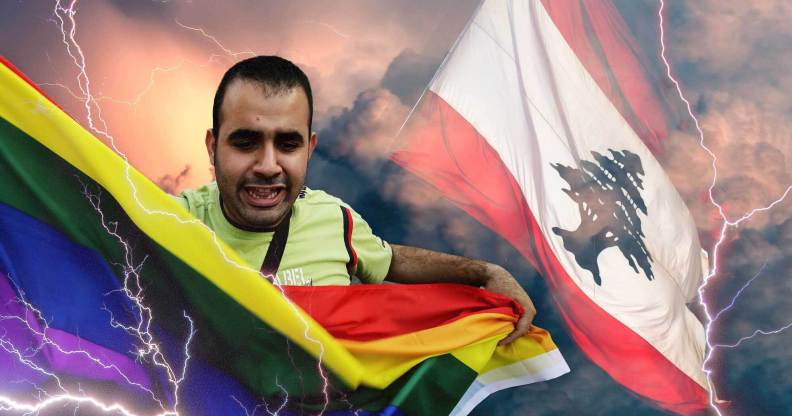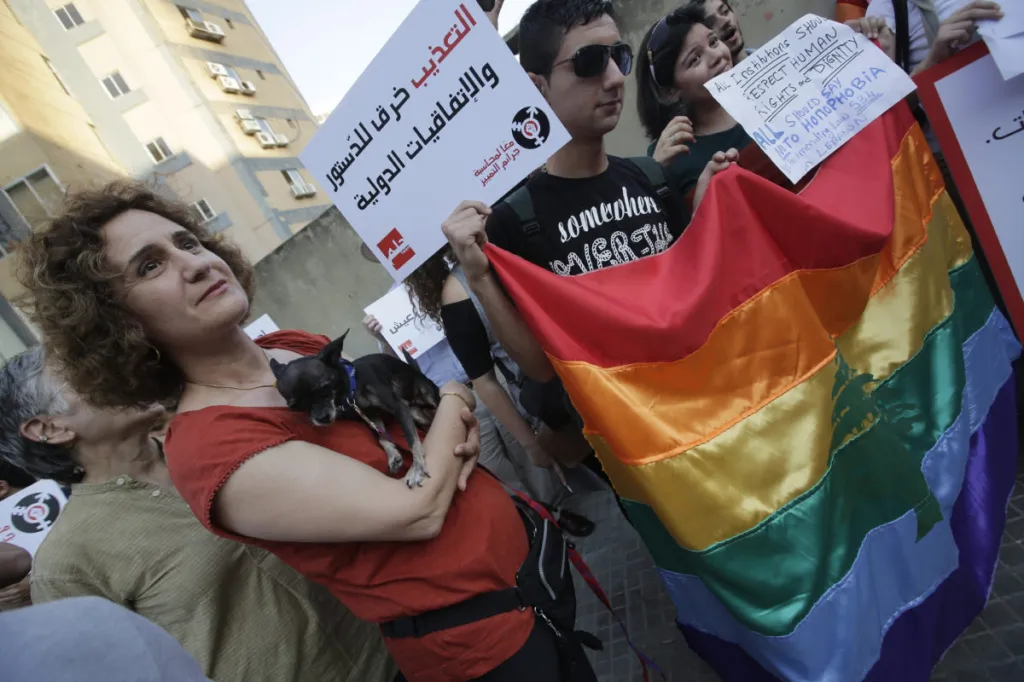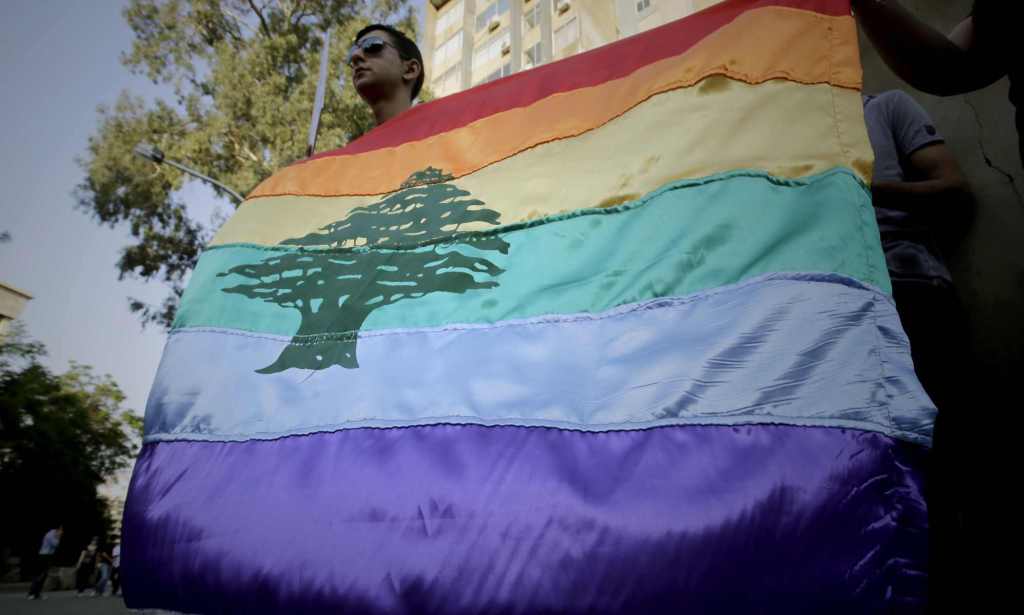Homophobia in Lebanon: Queer community ‘hopeless’ as ‘moral panic’ targets LGBTQ+ people

The LGBTQ+ community in Lebanon is facing an increasingly hostile crackdown by the country’s political and religious leaders (Getty)
The LGBTQ+ community in Lebanon is facing an increasingly hostile crackdown by the country's political and religious leaders (Getty)
For Amal – not her real name – who lives in a rural part of Lebanon, the rise in anti-LGBTQ+ rhetoric in the country has filled her with fear for her own safety and that of others.
Speaking to PinkNews about the unfolding situation for LGBTQ+ Lebanese people, she told of the “heartbreak” she feels for members of her community who “are being beaten up for just existing” by those “trying to eradicate us”.
The increasing wave of hostility in the country has included an attack on a Beirut gay bar by Christian extremist group Jnoud El-Rab (Soldiers of God), homophobic speeches by the country’s leaders, the banning of board game Snakes & Ladders, for apparently having rainbow colours, and the censoring of the Barbie movie.
However, this state of affairs has not always been the case and the increase in anti-LGBTQ+ violence speaks to a culture war that is being fanned by prominent figures in the country – to distract from national issues.
Despite its conservative laws and negative societal attitudes, Lebanon has long been considered a relatively safe haven for LGBTQ+ people in the Middle East.
Unlike in many other nations in the region, Lebanon’s LGBTQ+ community was able to be visible. People could meet in gay bars and watch drag shows, while Beirut Pride – the only LGBTQ+ Pride in the Arab world – saw 4,000 people march in support of love, acceptance and human rights in 2017.
However, in recent weeks and months Lebanon’s politicians, religious leaders and vigilante groups have sought to crack down on the freedoms of queer people, resulting in increasingly shocking vitriol, harassment and violence towards a community they accuse of being a “Western import”.
Although same-sex relations are not explicitly criminalised under Article 534 of Lebanon’s penal code – with landmark court decisions previously stating such consensual relationships are not illegal – the law punishes “any sexual intercourse contrary to the order of nature” and is used to harass LGBTQ+ people through unjust arrests and intrusive examinations.
In July, members of Lebanon’s parliament submitted a draft law that would effectively decriminalise homosexuality. However, the members who backed this move faced an online harassment campaign which resulted in one politician withdrawing his signature altogether.
In response, the culture minister and another politician submitted legislation which would specifically outlaw homosexual acts, as well as criminalise “promoting homosexuality”.

Lebanon’s crackdown on its LGBTQ+ population comes amid a time of unprecedented political and economic strife.
The country is currently in the grip of a four-year-long economic meltdown – compounded by the COVID-19 pandemic and the deadly explosion at the Port of Beirut, in 2020 – which has seen the local currency lose more than 90 per cent of its value, gross domestic product contract by 40 per cent and inflation rocket, pushing millions of people into poverty.
Politically, Lebanon has been in a deadlock and without a president for nearly a year, following a dozen failed parliamentary sessions to elect a new head of state.
The spiralling situation has led many to see the country’s sudden wave of hostility towards LGBTQ+ people as an attempt to distract the public from their own, and the nation’s, turmoil.
Speaking to Associated Press in July, Tarek Zeidan, the executive director of LGBTQ+ advocacy group Helem, said an anti-LGBTQ+ statement from the Interior Ministry sought to pit Lebanese people against one another.
“It was very clear that it was a deliberate decision to manufacture moral panic, to divert attention from the general political and economic disaster that is Lebanon today,” Zeidan said.
Amal echoed these concerns: “They’re using fearmongering to make people feel like the queer community is a threat to them.
“They take away our rights under the guise of ‘protecting the family unit’, ‘preserving our religious morals and values’, [saying] ‘homosexuality will kill our society’ and ‘this is the west trying to destroy our country by bringing this ideology here’ – and people believe them.”
She went on to note that LGBTQ+ people have also sought greater rights and to be more visible in Lebanon, so she feels authority figures “decided that no, no, they don’t want queer people to be in the public image”.
But she added: “It’s not just about queer people. They [Hezbollah, Lebanon’s Shia Islamist political party and militant group] want to limit everybody’s rights.”
She claimed “Hezbollah wants to make Lebanon similar to Iran”, which recently cracked down on its own population’s social and political freedoms following mass protests in the wake of the death of Mahsa Amini in September 2022.
“I’m trying to tell people, even if you don’t support the queer community, you have to care about this because when they get done with us, they’re going to move on to women… to other people in the country. But it’s like, no one cares.
“They’re using gay people, because they know that no one’s going to care.”
‘Hopeless‘
Before speaking to PinkNews, Amal asked friends about how the current situation is affecting them – and many are frightened.
One told her that she gets “so scared and so anxious” when violent incidents against the community happen, resulting in her avoiding the news altogether.
“She doesn’t even want to know what’s going on, it’s so scary for her,” Amal said.
Another friend described their feelings of complete “hopelessness”, saying they have reached the point where they “don’t want to fight any more”.
Amal said: “That’s really sad because the only thing we can do right now is try to fight against what’s happening.”
Some people have taken the attitude that “we’re used to it now, we don’t care”, but “for the most part, everybody is scared and [they don’t] know what to do”, she added.

Amal called on people outside Lebanon to donate money to organisations such as Helem, as a means of helping support the community.
She hopes that by speaking to news publishers outside Lebanon she can get the message out about what is happening the in the country and – perhaps – hold the government to account.
Increased international attention on Lebanon’s anti-LGBTQ+ rhetoric could make the country’s leaders “more hesitant to take away our rights”, but describing them as really brutal, she admitted they “probably won’t care”.
Human rights organisations speak up for Lebanon’s LGBTQ+ community
Human rights organisations have condemned Lebanon’s increasingly anti-LGBTQ+ rhetoric, with major international agencies and advocacy groups calling on the country to halt its political and social stigmatisation of the community.
“As Lebanon sinks deeper into crisis, the authorities are cracking down on the rights of LGBTI people and allowing unchecked violence against them,” said Rasha Younes, from Human Rights Watch.
“The Lebanese authorities should immediately scrap the proposed anti-LGBTI laws and end the ongoing attacks on basic freedoms.”
Meanwhile, Wadih Al-Asmar, the president of the Lebanese Center for Human Rights, said the government is “undermining basic rights” while “failing to enact urgent economic and justice reforms”.
He added: “LGBTI rights are fundamental human rights. Stifling them as an excuse to keep a portion of society marginalised under the false pretext of so-called public morals is detrimental to everyone’s human rights.”
And Amnesty International’s deputy regional director for the Middle East and North Africa, Aya Majzoub, described the attack on LGBTQ+-friendly bar Madame Om at the end of last month as an “alarming escalation… that followed troubling remarks by high-level politicians and religious figures”.
Majzoub continued: “Lebanon’s constitution guarantees equality, free expression and free assembly for everyone, and these rights must be respected. What happened at Madame Om offered an ominous sign of how the situation of the LGBTI people is deteriorating in the country.
“The Lebanese authorities must immediately stop creating an environment conducive for discrimination and violence against the LGBTI community to be perpetuated. Crucially, the government should ensure that everyone is protected from violence, regardless of their gender identity or sexual orientation.”

